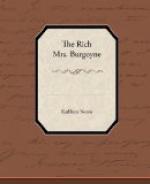Santa Paloma children were much given to parties, or rather their parents were; and every separate party was a separate great event. The little girls wore exquisite hand-made garments, silken hose and white shoes. Professional entertainers, in fashionably darkened rooms, kept the little people amused, and professional caterers supplied the supper they ate, or perhaps the affair took the shape of a box-party for a matinee, and a supper at the town’s one really pretty tea-room followed. These affairs were duly chronicled in the daily and weekly papers, and perhaps more than one matron would have liked the distinction of having Mrs. Burgoyne’s little daughters listed among her own child’s guests. Joanna and Ellen were pretty children, in a well-groomed, bright-eyed sort of way, and would have been popular even without the added distinction of their ready French and German and Italian, their charming manners, their naive references to other countries and peoples, and their beautiful and distinguished mother.
But in answer to all invitations, there came only polite, stilted little letters of regret, in the children’s round script. “Mother would d’rather we shouldn’t go to a sin-gul party until we are young ladies!” Ellen would say cheerfully, if cross-examined on the subject, leaving it to the more tactful Joanna to add, “But Mother thanks you just as much.” They were always close to their mother when it was possible, and she only banished them from her side when the conversation grew undeniably too old in tone for Joanna and Ellen, and then liked to keep them in sight, have them come in with the tea-tray, or wave to her occasionally from the river bank.
“We’ve been wondering what you would do with this magnificent drawing-room,” said Mrs. White, on her first visit. “The house ought to take a colonial treatment wonderfully—there’s a remarkable man in San Francisco who simply made our house over for us last year!”
“It must have been a fearful upheaval,” said Mrs. Burgoyne, sympathetically.
“Oh, we went away! Mr. White and I went east, and when we came back it was all done.”
“Well, fortunately,” said the mistress of Holly Hall cheerfully, as she sugared Mrs. Apostleman’s cup of tea, “fortunately all these things of Mrs. Holly’s were in splendid condition, except for a little cleaning and polishing. They used to make things so much more solid, don’t you think so? Why, there are years of wear left in these carpets, and the chairs and tables are like rocks! Captain Holly apparently got the very best of everything when he furnished this place, and I reap the benefit. It’s so nice to feel that one needn’t buy a chair or a bed for ten years or more, if one doesn’t want to!”
“Dear, sweet people, the Hollys,” said Mrs. White, pleasantly, utterly at a loss. Did people of the nicer class speak of furniture as if it were made merely to be useful? “But what a distinct period these things belong to, don’t they?” she asked, feeling her way. “So—so solid!”




